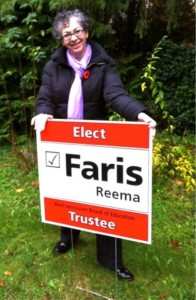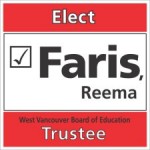Hierarchy And Assessment
The inaugural meeting of the new West Vancouver Board of Education will be held on December 13, 2011. On that date, I’ll be acknowledged as a Trustee and officially launched into my new role and new set of responsibilities.
In the lead up to that ceremony and the official recognition it entails, I also had the pleasure of meeting George Abbott, BC’s Minister of Education during his visit to the District earlier this week.
He met with the new Board for just over an hour for a very interesting, wide-ranging discussion touching on many of the key public education issues we are facing. He was thoughtful, approachable, keen to listen, and showed evidence of his personal commitment to his ministerial portfolio, one he’s held for approximately a year. He’s also got a very natural manner and a ready wit.
Minister Abbott’s visit was highly anticipated and a lot of planning went into making sure the day went smoothly. And while he struck me as very down-to-earth, I’m also aware that all the stops were pulled out for him and his team because of who he is.
In the lingo of our day, he is a Very Important Person.
As I have before, I found myself reflecting about the way we determine status in our society and the relative value of individuals. Think about the way we encourage our children to stand in line for autographs, to revere sports figures, to worship entertainers. In the case of anything related to Disney, those are line-ups for autographs from actors portraying characters. They aren’t real!
It seems to me we cannot escape the fact that we live in a very hierarchical system, one which by its very nature is inherently unfair. There are many inequalities in our society — economic inequality being one which served as the impetus for the Occupy movement — which we may find difficult to accept, which we may want to change, and which we may very well be stuck with for the foreseeable future.
 My musing on hierarchy then morphed into thinking about the role of assessment in education. The connection was heightened because I happened to be in the midst of grading papers for the undergraduate course at SFU for which I serve as a Teaching Assistant.
My musing on hierarchy then morphed into thinking about the role of assessment in education. The connection was heightened because I happened to be in the midst of grading papers for the undergraduate course at SFU for which I serve as a Teaching Assistant.
Marking has proven to be the most challenging aspect of the job. I have no trouble discerning which papers are better than others — the quality of the content, the writing style, the technical skill, the way in which ideas and concepts have been distilled and discussed — but attributing a letter grade which will affect a student’s standing in the course and in their academic year is difficult. But I have to do it, I have to give them a mark.
From this experience, I understand more clearly why there is so much discussion — heartfelt, sincere, despairing, dismissive, agonizing — about assessment in elementary and secondary education.
Marks can act as barriers, as obstacles. They judge, they differentiate. They are subjective, they are unfair, they may not reflect the abilities, competencies, talents, and skills of the child. At the same time, are they not completely suited to the way we’ve structured our societal institutions? So, if one makes the argument for the elimination of letter grades, for doing away with academic honours, are we in fact doing a disservice to our students? If they are schooled in an environment which reflects a world we’d like to see — peer-based and egalitarian — do we set them up for disappointment when they are exposed to the world as it is?
It seems to me a chicken and egg situation: do we change education first in order to engineer changes in society or does society have to change first in order for the structure of the educational system to shift?
It’s a puzzle I look forward to thinking about and learning about because at the end of the day our goal is to help students achieve the most in their life (which may be defined in many different ways), to climb “to the top” of their potential, even perhaps to be Minister of Education one day.
Looking Back And Looking Forward
“What is the first part of politics? Education. The second? Education. And the third? Education.”
Jules Michelet, 1798-1874
Le Peuple (1846)
Limbo.
That’s likely the best description for this past week. Not that I haven’t been busy.
My week comprises many elements, and they were all in play this week: being a Mom, working at SFU, participating in my Masters seminar, and doing my volunteer work not to mention meetings, social gatherings, social media monitoring, and chores. Sometimes I’m just boggled at what we cram into a week and, yes, social media monitoring now constitutes a significant portion of my daily life and warrants being designated as a time commitment — sometimes too much so!
It’s been a week since the municipal elections were held and I was elected a Trustee for the West Vancouver Board of Education.
First, there was the muted euphoria of November 19 — final results weren’t posted till 1:00 a.m. the following Sunday morning. Then, the declaration of the official results was made on Wednesday — a low key event attended by precisely three people in addition to the two members of the Legislative Services department: me, my son, and a West Vancouver resident who plays a key part in our community and who was instrumental in one of the municipal councillor campaigns.
I was in limbo because I’d been elected, but didn’t feel like I was doing anything to fulfill the requirement of my new role — aside from trying to catch up on my sleep and wade through the detritus of a five week campaign which still decorates my office like flotsam and jetsam after a storm. It wasn’t until Thursday when I met with Chris Kennedy, the district Superintendent, Carolyn Broady, the other first-time trustee, and had a tour of the district office that the situation began to feel real to me.
And now the wheels are beginning to turn with the promise of much more work in the coming weeks and the growing realization that I have been entrusted by over 3,700 residents of West Vancouver, Bowen Island, Lions Bay, and other GVRD areas to represent their interests in safeguarding, maintaining, and improving the public education system in our communities.
I’ve always voted, in every election at every level, and yet my own experience as a candidate ensures that I will be even more diligent about how I prepare for voting in the future because I understand, with greater insight now, what an act of faith it is to cast your ballot in favour of one candidate or the other.
I am anxious to get started and recognize the steep learning curve ahead of me. It’ll take time to get a good grasp of what’s involved, but I’m not concerned because I enjoy tackling new situations and look forward to the new experiences ahead of me.
However, there is a troublesome issue, a feature of our public education system, which is likely to colour the work I’ll be doing.
One of the new skills I’m developing is the use of Twitter to engage and connect with a wide range of people in all fields of work. My involvement with this social media platform, through the discussions I’ve had with new connections, has really shown me the extent of the rift in the public education sector in our province — it is rife with mistrust and anxiety. There also seems to be an ongoing tendency to demonize the stakeholders on either side of the bargaining table and I can’t help but feel that it’s counterproductive. How will we ever be able to work together effectively when whatever settlement is reached comes with such rancour? And this at a time when the Ministry of Education is consulting on what is meant to be a new direction for education to ensure the best for British Columbia’s students in the 21st century?
I guess I’m about to find out how that will affect the work I’m able to do in an effort to fulfill the expectations of all those who’ve expressed their support for me with their vote. More importantly, those who are looking for me to deliver on my commitment to help ensure the strength of a system which has a direct impact on the life experience of their children.
I will do my best.
Out And About In West Vancouver – Part Two
I filed my nomination papers on October 12, 2011, and I’m not quite sure how this happened, but five weeks have passed since then. A blink of an eye, a heartbeat, a breath.
It has been an intense five weeks: not so much because of the new challenge of running an election campaign for the first time, but because of the way the demands on my time and attention as a Mom, a candidate, an employee, a graduate student, and a volunteer seemed to escalate at the same time.
As much as I’ve enjoyed the experience, I have to admit I’m looking forward to kicking back tomorrow night, after what’s sure to be a frenetic day, to watch the results roll in once the polls have closed.
And even though tomorrow’s election day, I’ve already begun to file away lessons learned for the future. One of the most significant is that while it’s intimidating to promote yourself as a candidate, in the face of the reluctance of individuals to engage and the malaise that seems to hang over the modern electoral process, the connections you make are invaluable and essential.
I’m not just talking about the encouragement offered by friends and family or the surprising shouts of support from acquaintances, sometimes strangers. My favourite example of the latter was a woman who said to me, “I was talking to my son in Singapore today and he said to vote for Reema Faris.” I didn’t know her, I don’t know her son, but I had been recommended as a candidate in a message sent out by a supporter to acquaintances and colleagues, one of whom was the man in Singapore!
Other connections, connections which may be transitory or incidental, take on additional significance during a campaign because they resonate with meaning. I wrote about one such connection last night: the story of my conversation with a teacher for the visually-impaired who I met during a meet and greet at the Park Royal Shopping Centre last weekend.
I had a number of conversations that day, all of them meaningful in their own way. And one that sticks with me was the interaction I had with a woman who shrugged apologetically in passing, saying that she didn’t have children in the school system.

With all the activity in the days since, my recollection of the details is already hazy, but I think she did pick up a copy of my brochure and we did talk briefly.
What was so significant about this interaction?
Well, I’ve heard that assertion before: “I don’t have children in the school system”. And while that would make the election of Trustees more directly relevant to a voter, the Board serves on behalf of the entire community. So while it’s critical that you get out to vote tomorrow, please take the time to encourage everyone you know who also votes to cast their ballots, not just for Mayor and Council, but for Trustees as well whether or not they have school-age children or grandchildren. The Board of Education is theirs and they have a right to exercise their discretion in choosing candidates who will serve on their behalf effectively, efficiently, diligently, and passionately.
As I hope to do in West Vancouver.
Out And About In West Vancouver – Part One
Last Saturday, Park Royal Shopping Centre offered council candidates the opportunity to hang out at “the mall” to meet voters.
 Trustee candidates were not contacted directly, but Nora Gambioli, my friend and neighbour who is seeking election as a District councillor, let me in on the plans and we shared a display table in the centre court of the North Mall. Watching Nora engage people — she has campaigned before — inspired me and I enjoyed the time I spent meeting with residents and voters.
Trustee candidates were not contacted directly, but Nora Gambioli, my friend and neighbour who is seeking election as a District councillor, let me in on the plans and we shared a display table in the centre court of the North Mall. Watching Nora engage people — she has campaigned before — inspired me and I enjoyed the time I spent meeting with residents and voters.
There was coffee on the go and sugar cookies decorated with reddish icing — the word “Vote” had been inscribed on the top of each treat. Passers-by were much happier taking the time to snag a cookie and a cup than they were to talk to candidates. However, connections were made and there was a full range of interaction that day: from the “I will avoid eye contact at any cost” to the “I’ll acknowledge with a smile, a nod and move on” to “I was wondering”.
One of the most informative discussions I had was with a teacher for the visually-impaired. She had previously worked in West Vancouver and now commutes to Surrey to teach there.
We had an engaging discussion and spoke at length about the challenges she faces in her work.
One of the most interesting points I took from our conversation — aside from the keen sense of her commitment to her students and her passion for her profession — had to do with how the nature of her work had changed.
She explained how visual-impairment now was often not treated as a singular challenge. That is, the students she works with now may be struggling with little or no vision, but they must also contend with other issues as well, such as autism or behavioural challenges.
Perhaps the ways in which student needs are identified have changed and the increasing sophistication of diagnosis has helped to identify a range of support and assistance required.
Our conversation emphasized how important it is, in addressing the special needs of students, to look at the whole individual. We have to identify the complete complex set of factors with which a child may be dealing, and we may not be able to rely on the work of one individual to help a child, no matter how committed or passionate, because their skills may only address one area of need — we need a team approach which capitalizes on the strengths and specializations of the personnel and resources available.
I know that the West Vancouver School District has worked very hard to help address the needs of its students. Jody Langlois and the team at Student Support Services do great work.

If elected, I look forward to learning more about the approach they’ve taken in West Vancouver to support our students. I hope also to work, as a Trustee, to make sure the programs in place continue to evolve and adapt to new research findings and new modalities of service in order to provide support and assistance to students with special needs on the basis of who they are as a whole, valued individual.
Why Women’s Rights Are An Education Priority
Here are some numbers I came across while preparing for an upcoming presentation:
- Women constitute 53% of the world’s population and own 1% of the wealth
- Women still earn 20% less than men
- In Canada, women occupy only 11% of the seats on corporate boards
- Of the 308 parliamentary seats in Canada’s House of Commons, only 68 (22%) are filled by women
- According to the New York-based Women’s Media Centre, only 3% of media decision makers are women
- In the 2010 Report on the Global Gender Gap issued by the World Economic Forum, which assesses criteria such as employment equity, health care, and political representation, Canada ranked #20 — a free-fall from #7 in 2005 — putting our country behind the US for the first time ever in terms of its treatment of the female population.
What does this all mean?
I think it means that even in our developed Western world, where gender inequalities are not as apparent as they may be elsewhere, there’s a lot of work to do in sustaining women’s rights and in working towards a better, more just society. There are worrying indications and further support to be found for this need in articles such as this one from The Globe & Mail on the reduction in the number of women appointed to the judiciary.
My focus here is not to talk about the broader social policy issues — at least not today — but I would like to address what I think this may mean in terms of educating young men and women, boys and girls.
Let’s look at what some consider the three levers of our modern society — money, politics, and the media — and some subject areas or topics which could be incorporated into or emphasized in the curriculum.
Money
On the premise that the more you understand money and how it works, the better you’ll manage your own financial situation. Are we teaching enough about:
- financial literacy and budgeting?
- economics and the history of financial economics?
- how to contend with the lure of consumerism?
Unless you learn why politics is important, how our system works, and its history, you’ll never see or understand the relevance to you and the world you live in.
- Why aren’t K-12 students exploring elections as they happen? In our community, students from Capilano University helped to run the All Candidates Meeting hosted by the West Vancouver Chamber of Commerce (Trustees were not included in the official proceedings). However, as far as I know, none of the municipal candidates were invited into schools to talk to students or to answer questions. If our intent is to improve the engagement of youth in the electoral process, why not take advantage of real life situations when they are current and relevant?
- Is the history of the struggle for women’s rights highlighted when Canadian history is being taught?
- Are biographies or autobiographies of Canadian women included on reading lists for social studies courses or even as examples of non-fiction in English or French language classes?
Media
It surrounds us, it influences us, it continually evolves and changes. In a recent CBC documentary, Naomi Wolf, author of The Beauty Myth, says she finds media images of women getting worse, reinforcing unrealistic expectations and norms. Are we doing enough to educate students about the media — advertising, movies, music videos, song lyrics, newscasts, etc. — and the influence it has on our behaviours and attitudes? Did you know that misogynist comments on-line are starting to drive female journalists and bloggers off-line according to a recent article in the UK newspaper, The Guardian. Women’s voices need to be heard and represented, not shrouded in the silence of earlier eras that would negate the work of great Canadians such as Henrietta Muir Edwards, Nellie McClung, Louise McKinney, Emily Murphy, and Irene Parlby. https://archives.cbc.ca/on_this_day/10/18/
There are many other ideas and initiatives we could pursue and explore. Paying attention to these three areas would be a start because the issue of women’s rights is an issue of human rights — not just abroad, but here at home.